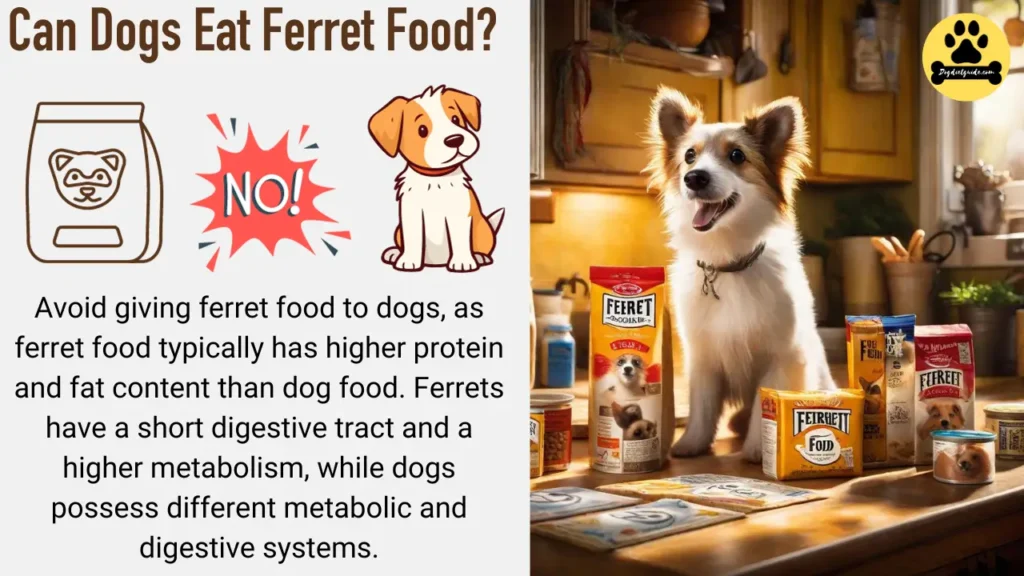When it comes to our furry companions, their health and well-being are of utmost importance. As pet owners, we often question the compatibility of different pet foods. One common query is, can dogs eat ferret food.
Ferret Food For Dogs Overview
Avoid giving ferret food to dogs, as ferret food typically has higher protein and fat content than dog food. Ferrets have a short digestive tract and a higher metabolism, while dogs possess different metabolic and digestive systems. Feeding ferret food to dogs may not be well-tolerated and could lead to health complications for your pup.
| Nutrient | Ferret Food | Dog Food |
|---|---|---|
| Protein | High (32-40%) from animal sources | Moderate (18-25%) from a mix of sources |
| Fat | High (15-20%) | Moderate (8-15%) based on breed and activity |
| Carbohydrates | Low, minimal | Moderate to High (30-70%) from grains and vegetables |
| Taurine | Higher levels required | Adequate levels, varies by brand |
| Vitamin A | Preformed vitamin A needed | Can utilize beta-carotene for vitamin A |
| Omega-3 & Omega-6 Fatty Acids | Essential for skin and coat health | Important for skin and coat health |
Can Dogs Eat Ferret Food?
No. If a dog eats a small amount of ferret food as an occasional treat, it is unlikely to cause immediate harm. However, prolonged consumption of ferret food may lead to nutritional imbalances in the long run, as it may need more essential nutrients than dogs require in their diet.
Dogs are omnivores, meaning they can consume various foods, including meat, vegetables, and grains. Ferrets, in contrast, are obligate carnivores, signifying that their dietary requirements are predominantly centered around meat consumption. Ferret food is designed to provide the high protein and fat content that ferrets need.
It’s always best to feed your dog a well-balanced, species-appropriate diet formulated for dogs. If you have concerns about your dog’s nutrition or if they accidentally consume a significant amount of ferret food, it’s advisable to consult with your veterinarian for guidance.

Side Effects of Feeding Ferret Food to Dogs
-
Ferret food may lack the essential nutrients dogs need, leading to imbalances, deficiencies, or excesses.
-
Higher protein levels in ferret food can strain the kidneys of dogs, potentially causing health issues.
-
Elevated fat levels in ferret food may contribute to obesity and related health problems in dogs.
-
Varied mineral compositions in ferret food may lead to excessive intake of certain minerals, impacting dogs’ health, especially bone health.
-
Some ingredients in ferret food may be challenging for dogs to digest, resulting in gastrointestinal issues like diarrhea, vomiting, or constipation.
-
Ferret food might contain additives or preservatives that are safe for ferrets but could cause adverse reactions in dogs.
-
Ferret food may have higher taurine levels, potentially impacting dogs differently, as dogs can produce taurine naturally, and excess intake may have unknown consequences.
Related Post: My Dog Ate Spicy Food What Do I Do?
What Happens If A Dog Eats Ferret Food?
If a dog eats ferret food occasionally, it is unlikely to cause significant harm. If a dog consumes a large amount of ferret food or does so regularly, it could lead to digestive upset, obesity, or other health issues over time.
That said, it’s important to note that long-term consumption of ferret food can lead to nutritional imbalances in dogs.
If you suspect that your dog has ingested a significant amount of ferret food or notice any signs of distress, such as vomiting, diarrhea, lethargy, or other abnormal behavior, it’s essential to consult your veterinarian.

Safe Alternative
There are numerous high-quality dog food options available. Option for reputable brands that meet the nutritional standards set by veterinary professionals.
This ensures that canines receive the essential nutrients required for their overall well-being.
Remember, each pet is unique, and consulting with a veterinarian for personalized advice is the best approach to guaranteeing the optimal health and nutrition of your dog.
Related Post: Is Braunschweiger Safe For Dogs?




![Can Dogs Eat Blood? 7 Side Effects [Expert Opinion]](https://petskor.com/wp-content/uploads/2022/04/Webp.net-resizeimage-12.jpg)
